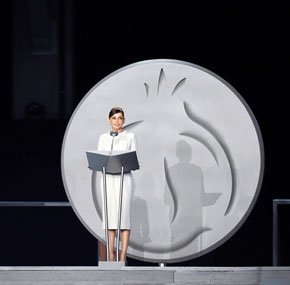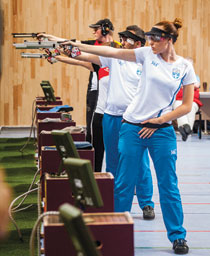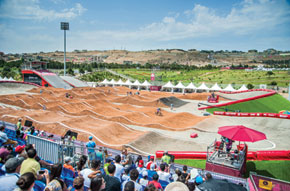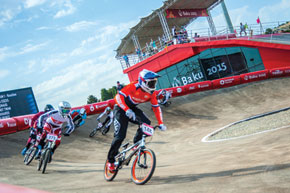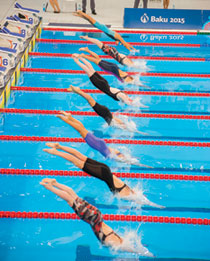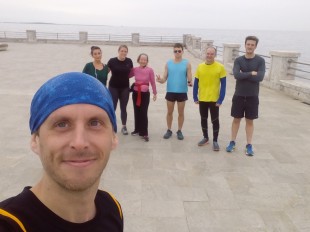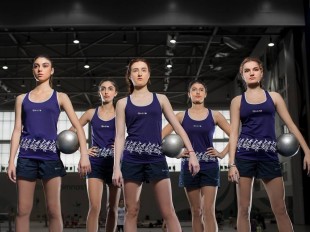A mixture of sadness and joy accompanied the closing ceremony of the inaugural European Games as it petered out into the night of 28 June. Sadness at Baku’s greatest sporting festival to date coming to an end and joy due to the splendour, scale and manner with which Baku and Azerbaijan had spent the previous 17 days living, breathing and sleeping top-class international sport, from the beaches of Bilgah and the coastal breeze of Bibi-Heybat to the bright lights of Flag Square, the Boulevard and the contemporary beauty of the Olympic Stadium.
Some of European sport’s biggest names came out firing and plenty of new champions were crowned. Sports such as swimming and water polo unearthed bright junior talent, Olympic staples like boxing, wrestling and gymnastics were fiercely contested and non-Olympics sports such as sambo, basketball 3x3 and beach football were endlessly entertaining and staked their claims for greater inclusion in modern multi-sport Games. From the first whistle to the last, each and every sport thrilled in its own particular way.
Some of European sport’s biggest names came out firing and plenty of new champions were crowned. Sports such as swimming and water polo unearthed bright junior talent, Olympic staples like boxing, wrestling and gymnastics were fiercely contested and non-Olympics sports such as sambo, basketball 3x3 and beach football were endlessly entertaining and staked their claims for greater inclusion in modern multi-sport Games. From the first whistle to the last, each and every sport thrilled in its own particular way.
Russia shone
In a remarkable display across the board the Russian team topped the medals table with a haul of 164 medals, 79 of which were gold, lapping even second placed Azerbaijan (56 medals). Their dominance was particularly evident in the pool, where Russian swimmers won 23 of a possible 42 medals in what doubled as the European Junior Swimming Championships. Standout performers were Arina Openysheva with seven golds and Daniil Pakhomov who won four golds and twice broke the 100 metres butterfly junior world record.
Team Russia also shone in the synchronised swimming, combat sports wrestling and sambo and in the gymnastics, with seventeen-year-old Yana Kudryavtseva winning three gold medals in the rhythmic discipline. In beach soccer and 3x3 basketball the Russians also prevailed, the 2013 World Cup winning men’s soccer team beating the Italians 3-2 in a thrilling final despite losing to the same team in the group stages, and both the men’s and women’s 3x3 basketball sides defeating Spain in the final with an identical score of 18-14.
… And so did Azerbaijan
Few would have predicted Azerbaijan to pip the British team to second in the overall medals table prior to Baku2015, but that’s exactly what they did. Azerbaijan won medals in a range of sports, including canoeing (Valentin Demyanenko – men’s canoe single 200m gold), triathlon (Rostyslav Pevtsov – men’s bronze), and fencing (Sevinj Bunyatova – women’s bronze).
But Azerbaijan really excelled in the combat sports and dominated the boxing in particular, winning six gold medals in the men’s competition from a possible 10. Three of those came on the final day of competition - Albert Selimov (lightweight), Parviz Baghirov (welterweight) and Abdulkadir Abdullayev (heavyweight).
Only British boxer Joe Joyce prevented the Azerbaijanis from taking a clean sweep that day, winning the men’s super heavyweight tournament and cementing Team GB’s third place overall. Elsewhere the British experienced their greatest success in the pool, with 23 medals in swimming in all and four golds in the men’s and women’s diving (James Heatley; Matthew Lee; Katherine Torrance; Lois Toulson).
The best of the rest
The remaining nations provided plenty of compelling performances. The Swiss raced into a surprising lead on the opening days of the Games thanks to a first, second and third in the men’s mountain biking (Nino Schurter, Lukas Fluckiger and Fabian Giger respectively) and gold and silver in the women’s race too (Jolanda Neff and Kathrin Stirnemann).
It was no surprise that the Italians lit up the fencing, winning three gold and a total of 12 medals (a quarter of those on offer), despite not fielding their top athletes, but they also came out firing in the shooting and won three bronze, four silver and four gold, including by boyfriend-girlfriend pairing of Petra Zublasing and Niccolo Campriani in the 10m mixed team air rifle. Also worth mentioning is the remarkable success of tiny San Marino at the range, with each of their three shooters medalling.
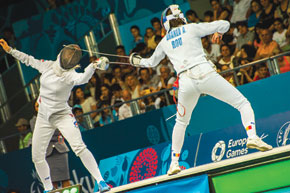
Ana Maria Branza of Romania wins gold against
Yana Zvereva of Russia in the women’s epee gold medal bout
Belgian trio Julie van Gelder, Ineke van Schoor and Kaat Dumarey completed a clean sweep of the women’s acrobatic gymnastics, taking all three golds, whilst their neighbours the French topped the judo (doubling as the 2015 European Championships) tables following the final day of a fiercely competitive contest at the Heydar Aliyev Arena, winning gold in the men’s and women’s team events.
Meanwhile the Hungarians and the Germans (fourth overall) took charge on the River Kura in the canoe and kayak events in Mingachevir, the Germans winning seven medals and the Hungarians an impressive five golds and five bronze. Over in Crystal Hall the ‘fighting Irish’ lived up to their reputation as London 2012 star Katie Taylor took gold in the lightweight division and Michael O’Reilly matched the feat by winning the men’s middleweight tournament.
In other sports, Denmark shone in the badminton with three gold medals (women’s singles; men’s doubles and mixed doubles) and Slovakia stole a dramatic last gasp victory in the team athletics competition from Austria, who dropped the baton in the 4x400m relay, the last event of the competition. The athletics competition took place in the form of the third tier of the European Athletics Team Championships, the first four teams gaining promotion to league two. Azerbaijan just missed out by finishing in fifth, closely behind the Moldovans.
A tale of two ceremonies
Baku’s long-awaited moment in sporting history had opened with a dazzling show on 12 June, which left few illusions of the scale of things to come. Two hours of performance and colourful pyrotechnics shaped by Dimitris Papaioannou, responsible for the 2004 Athens Olympics opening ceremony, led spectators on an enchanting journey into Azerbaijan’s fascinating past, with scenes depicting the poems of Nizami Ganjavi, the rock engravings of Qobustan and Azerbaijan as the ‘Land of Fire’. And few will forget the surprise appearance of Lady Gaga and her spine-tingling rendition of John Lennon’s ‘Imagine’.
Two weeks later the equally majestic closing ceremony, directed by Mark Hadley (previously Artistic Director with the Cirque du Soleil), blended contemporary and folk music, dance, acrobatics and architecture – the Maiden Tower, the Flame Towers and Ateshgah. Scenes of carpet weaving, Azerbaijani landscapes and the ever-present symbol of fire reflected Azerbaijani spirit and identity, and Baku2015 finally came to a close following the thundering of fireworks with performances by John Newman and British electronic group Clean Bandit.
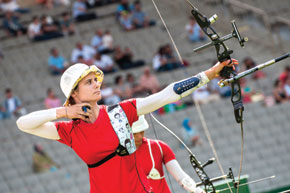
Danish archer Jager Maya competing on 21 June in
the women’s individual event, eventually winning silver
Legacy
The first European Games will be remembered in Azerbaijan as a roaring success, for uniting a country with sporting pride and delivering an Olympic scale event. The country is already counting down to the Islamic Solidarity Games in 2017. Amongst athletes and volunteers the Games will be remembered for their world-class stadia, competitive and respectful spirit and smooth organisation.
Whether the European Games will become a permanent fixture on the sporting calendar, grow to attract the biggest names and competitions across all sports, and be attributed the status of the Asian or Pan American Games, remains to be seen. But Baku has set the bar high – high enough even to frighten off future bidders - and positioned itself for a possible 2024 Summer Olympics bid.
Meanwhile Baku2015’s legacy stretches beyond the direct sporting and infrastructural benefits – the new roads, venues, parks and boulevards. 188 members (162 Azerbaijani) of the Baku2015 Games Academy, a collaboration between the Azerbaijan Youth Foundation and Baku 2015, graduated on 1 July after gaining a year’s hands-on experience in international sports management and helping to bring the Games to fruition.
There are hopes for spin-offs to tourism too. President Ilham Aliyev has called for hotels to drop their prices and for quicker visa processing as Azerbaijan hopes to attract increasing numbers of tourists in the wake of the Baku2015, which according to Azerbaijani media organisation Azertaj reached a global audience of 823 million people across some 145 countries.
And thanks largely to the Games’ legacy of volunteering - the 17,000 good-natured, intelligent and enthusiastic volunteers stationed throughout the city – the country is well prepared to receive and welcome the growing international attention and tourism it is likely to get

